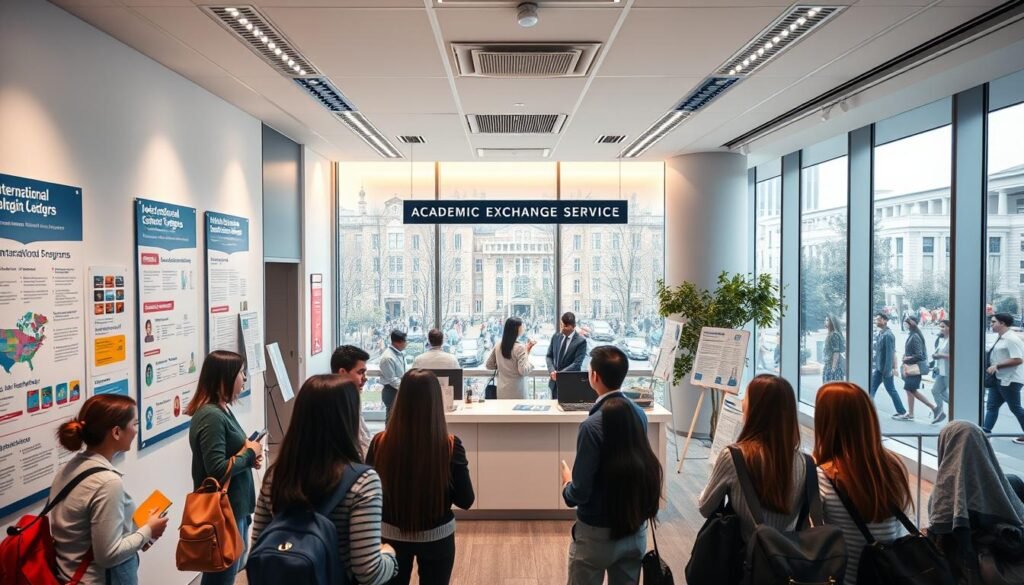
Apply for fully funded international scholarships Germany 2026 Now

Picture this: you arrive in Berlin with a suitcase, a research idea, and a single acceptance letter. You find a small flat, meet peers in a café, and realize tuition is low but living costs add up fast.
In this guide, you’ll get clear, practical information to plan your 2026 application timeline. You’ll learn which scholarship and fellowship options cover stipends, travel, and insurance.
Expect a roadmap that shows who can apply, what each program covers, and how to craft a standout application. We’ll point to major funders like DAAD, Erasmus+, political foundations, Humboldt, MSCA, and notable university awards.
Learn how to find, apply for, and win top scholarships for 2025–2026 across the US, UK, Canada, and Australia.
Explore Scholarships Guide →By the end, you’ll know which opportunities fit your study level, how to time your materials, and which documents strong applicants prepare early.
Start your search with this overview and then explore specific listings at detailed graduate funding to match your goals for the year ahead.
- Why Germany in 2026: affordability, access, and fully funded pathways
- Who you are: eligibility snapshots for international students and doctoral candidates
- Government and organization-funded programs you should prioritize
- Political foundations with generous funding for international students
- Research-focused and postdoctoral fellowships in Germany
- fully funded international scholarships Germany: your 2026 resource list
- University-based opportunities and notes from German institutions
- Deadlines and timing: how to plan your 2026 application year
- How to apply: requirements, documents, and selection insights
- Costs, language, and support services while you study
- Secure your place now: align your 2026 goals with the right German scholarship
Why Germany in 2026: affordability, access, and fully funded pathways
If you want affordable higher education in 2026, Germany delivers predictable pathways and strong aid.
Public universities often charge little or no tuition, so your main worry is living costs. That makes targeted awards and monthly stipends crucial for students who need help with rent, travel, and insurance.
National and European frameworks such as DAAD and Erasmus+ expand mobility and access. Early coordination with your home institution makes the application timeline easier to manage.
You can combine university awards with national programs to cover research expenses and everyday costs. Political foundations and merit schemes offer additional routes if you show leadership and social engagement.

- Low tuition at public universities reduces overall cost pressure.
- Stipends and allowances bridge living expenses for many students.
- Predictable cycles help you align application steps for 2026 openings.
| Support Type | Typical Coverage | Best For | Timing |
|---|---|---|---|
| DAAD programs | Monthly stipend, travel, insurance | Masters, PhD, research stays | Annual calls, plan 6–12 months ahead |
| Erasmus+ | Mobility grants, fee waivers | Exchange students and short research visits | Semester-based windows, coordinate early |
| Foundation & merit awards | Stipends, mentoring, networks | High-achieving students and leaders | Variable cycles; apply as announced |
| University scholarships | Top-up stipends, research funds | Degree candidates at host universities | Linked to admission and fiscal semesters |
Who you are: eligibility snapshots for international students and doctoral candidates
Identify your status degree seeker, exchange visitor, or researcher to narrow program choices fast.

If you are an international degree student, look for DAAD, StipendiumPlus, and Deutschlandstipendium at partner universities. These options reward strong grades and clear potential.
If you are an exchange student, Erasmus+ opens mobility windows when your home and host have an agreement. You may get tuition exemptions and a monthly stipend.
If you are a visiting researcher or doctoral student, DAAD, Humboldt, MSCA, and some foundations run discipline‑agnostic calls. Most require a supervisor letter and a focused research plan.
- Master candidates at public or state‑recognized institutions often qualify for stipends plus travel and insurance.
- Doctoral students and students doctoral candidates need to show research quality and references.
- Postdocs can apply for fellowships from 6 to 24 months with family and travel allowances in some calls.
| Profile | Typical Programs | Key Requirements |
|---|---|---|
| Degree seekers | DAAD, StipendiumPlus, Deutschlandstipendium | Academic record, admission, sometimes language proof |
| Exchange students | Erasmus+ | Institutional agreement, nomination, mobility plan |
| Doctoral & researchers | DAAD research, Humboldt, MSCA, foundations | Supervisor support, research proposal, publications |
Practical tip: align your profile to a few best‑fit programs to reduce application work and raise success odds. For an example listing, see this scholarship listing.
Government and organization-funded programs you should prioritize
Start by focusing on government and partner programs that give the broadest living and travel support. These options often set clear timelines and cover core costs so you can plan your semester and start dates.

DAAD scholarship programs: scope, funding, and country-specific deadlines
DAAD offers robust monthly stipends about €992 for graduates and €1,300 for doctoral candidates plus travel and health insurance.
You must meet academic performance and language rules. Check country-specific deadlines early; they vary by call and applicant type.
Erasmus+ for exchanges: cooperation agreements, stipends, and fee exemptions
Erasmus+ removes host tuition, registration, and exam fees while giving a travel grant and monthly support for students on exchange.
To qualify, your home and host must hold an inter‑institutional agreement. Prepare a strong motivation letter, GPA evidence, and language proof for the application.
StipendiumPlus network: income-based student support and doctoral funding
StipendiumPlus bundles partner foundations to offer income‑based aid up to about €855 for students and €1,550 for doctoral candidates.
Allowances for health and childcare may apply. Eligibility often follows Section 8 BAföG rules for applicants from abroad verify each awarding body.
Deutschlandstipendium at partner universities: merit-based €300/month
The Deutschlandstipendium awards €300 per month at participating university partners. Selection is merit-driven and not income-tested.
Applications usually open June–August. Strong grades and documented engagement make you competitive.
| Program | Typical Coverage | Who should apply |
|---|---|---|
| DAAD | Monthly stipend, travel, health insurance | Graduates, doctoral researchers, german academic applicants |
| Erasmus+ | Travel grant, monthly stipend, tuition/exam fee waiver | Exchange students with institutional agreement |
| StipendiumPlus | Income-based stipends, health/childcare allowances | Students and doctoral candidates meeting BAföG Section 8 rules |
| Deutschlandstipendium | €300/month merit award | High‑achieving students at partner university |
Tip: balance a national award like DAAD with a university scholarship to maximize coverage. Track each program's deadline and submit required documents well before the semester start for smooth processing.
Political foundations with generous funding for international students
Foundations look beyond grades; they fund applicants who show social purpose and clear impact.
Heinrich Böll Foundation
Who it suits: masters and doctoral students with civic engagement.
Student scholarship rates vary: up to €812 + €300 (EU) or €992 plus insurance (non‑EU). Doctoral students may receive about €1,450 plus a €100 allowance (EU‑educated) or €1,400 with mobility support (non‑EU).
Plan around two annual deadlines: March 1 and September 1. Prepare a strong research proposal if you apply for doctoral support.
Friedrich Ebert Foundation
This foundation values academic merit plus sustained socio‑political commitment.
Students receive roughly €992/month; doctoral funding can reach €1,400/month for up to three years. Deadlines vary, and doctoral calls may be open year‑round.
Konrad‑Adenauer‑Stiftung
KAS looks for leadership, volunteer work, and proof of B2 german language ability.
Support commonly runs €992/month for a master (two years) and €1,400/month for doctoral students (three years). Regional calls set specific deadlines check your office for eligibility before you apply.
| Foundation | Typical student support | Key requirements |
|---|---|---|
| Heinrich Böll | €812–€1,450; allowances | Engagement, strong proposal, deadline |
| Friedrich Ebert | €992–€1,400; multi‑year | Socio‑political commitment, merit |
| Konrad‑Adenauer | €992–€1,400; regional calls | B2 german language, leadership, volunteer work |
Tip: Match your degree level and values to each foundation, gather language proof early, and tailor your motivation letter to the mission to boost your chance.
Research-focused and postdoctoral fellowships in Germany
If you aim to deepen a niche project with a German host, several research fellowships match different career stages.
Humboldt Research Fellowship
What it offers: postdoc €2,700/month (6–24 months); experienced researcher €3,200/month (6–18 months, split visits possible). Committees meet in March, July, and November.
You must secure a host confirmation and expert reviews. Suitable applicants include early postdocs and those just after completion of a doctorate.
Marie Skłodowska‑Curie Actions (MSCA)
What it offers: 12–24 months, open to all nationalities, with living, mobility, family, and special needs allowances. Assessment weights: Excellence 50%, Impact 30%, Implementation 20%.
Use the rubric to shape training and career impact. The next call opens May 8, 2025, so time your proposal before the deadline.
Bayer Foundation Fellowships
What it offers: up to €10,000 for short projects (up to 6 months) in medical, pharma, agricultural, and data science fields. The 2025 call runs Feb 14–Apr 11.
These scholarships are ideal for focused study visits, travel, visa, and exceptional project costs.
| Fellowship | Duration | Support | Key criteria |
|---|---|---|---|
| Humboldt | 6–24 months | Monthly stipend, family, travel | Host confirmation, expert reviews |
| MSCA | 12–24 months | Living + mobility + allowances | Excellence/Impact/Implementation |
| Bayer Foundation | Up to 6 months | Up to €10,000 for project costs | Field-specific, short-term proposal |
Practical tip: if you are near completion, align Humboldt timing and the MSCA call so your eligibility and proposal readiness converge. Visit the official website for up-to-date application information and templates.
fully funded international scholarships Germany: your 2026 resource list
Use this quick reference to see how top programs stack up on stipends, travel, and insurance.
Program coverage at a glance: stipends, travel, insurance, and allowances
Expect core coverage to include a monthly stipend, travel allowance, and health insurance. Some awards add family, childcare, or research funds.
- DAAD: monthly stipends (€992–€1,300), travel, and health insurance.
- Erasmus+: mobility grants, monthly aid, and tuition or fee exemptions at the host university.
- Deutschlandstipendium: €300/month merit top-up that can be paired with other support.
- StipendiumPlus: income-based stipends (student up to ~€855) and targeted allowances.
- Foundations, Humboldt, and MSCA: possible family and mobility add-ons for researchers.
Language requirements: German and/or English
Some programs accept English for coursework and research. Others expect B2-level german language for seminars, clinical work, or local engagement.
Tip: align your language certificates to the highest required standard and keep a simple resource list of each program’s coverage so you can budget across semesters and projects.
University-based opportunities and notes from German institutions
Campus programs often give the fastest route to aid because they pair admission with local funding and clear application steps.
- Technical University of Munich (TUM) runs the Linde/MDSI Master Scholarship. If you study Data Engineering and Analytics or Mathematics in Data Science, you can get €1,000/month for up to 12 months. Note the last known deadline: Mar 2, 2025, and watch each semester for new calls.
- Heidelberg University offers HAUS Scholarships for U.S. applicants. These grants provide $4,500 per undergrad semester and $7,000 per master’s semester. The 2025/2026 deadline is Jun 8, 2025.
- Universität Hamburg awards merit support up to €930/month for students and up to €1,200/month for doctoral applicants. Funding runs 12 months with reapplication options for up to three years.
- University of Stuttgart points you to the DAAD database as a primary resource. Keep in mind DAAD awards at Stuttgart do not cover the €1,500 non‑EU tuition fee, so plan your costs accordingly. Political foundation calls often require strong German, and the Deutschlandstipendium is a campus merit option you should pursue.
| University | Program | Typical Support | Key notes |
|---|---|---|---|
| Technical University of Munich | TUM Linde/MDSI Master Scholarship | €1,000/month (up to 12 months) | For Data Science masters; deadline Mar 2, 2025; semester calls |
| Heidelberg University | HAUS Scholarships (U.S. applicants) | $4,500 (bachelor) / $7,000 (master) per semester | One‑semester awards; deadline Jun 8, 2025; possible extension |
| Universität Hamburg | Merit Scholarships | Students €930/month; Doctoral €1,200/month | 12‑month funding; reapply up to 3 years |
| University of Stuttgart | Campus guidance & DAAD links | Varies by program; Deutschlandstipendium available | DAAD does not cover €1,500 non‑EU tuition; IO temporary aid deadlines Jan 31, Jun 30, Oct 31 |
Actionable tips: check each university website for the latest application forms and deadlines. Coordinate with your international office early so your admission, application, and semester plans align.
Deadlines and timing: how to plan your 2026 application year
Start mapping dates and tasks early to align document prep with each program’s submission periods. Begin work while you are still in your home country so reference letters, transcripts, and language tests are ready well before university admission windows open.
Start from your home country
Do research months ahead. Many programs require certified records, transcripts, and local verifications that take time to obtain.
If you wait for an admission offer, you may miss foundation rounds or emergency support windows.
Foundation cycles and rolling reviews
Foundations often run spring and autumn rounds. For example, Heinrich Böll uses March 1 and September 1, while some Konrad‑Adenauer regional calls fell on Mar 9 and Feb 23 in 2025.
Track rolling or regional deadlines on each foundation’s website and set reminders one month before each deadline.
Concrete timing examples and planning rules
Use fixed dates as anchors. University temporary aid windows (Jan 31, Jun 30, Oct 31) are useful contingency points. Expect results in about 4–6 weeks after a deadline, which affects visa and housing timeframes.
- Map the year with key deadlines and add a two‑week buffer for reference checks.
- Align MSCA proposal work with the May call opening and internal host reviews.
- Prioritize applications that offer the largest coverage or run less often in the year.
Final tip: confirm every deadline on the official program website before submission. Build a shared calendar and set reminders weeks in advance so you and your referees finish materials on time.
How to apply: requirements, documents, and selection insights
Treat each application like a short project. Map deadlines, list required documents, and assign time for referees and translations. This keeps you calm and on schedule.
Academic records, motivation, research proposals, and references
Start with core documents: official transcripts, degree certificates, and a CV tailored to the scholarship criteria.
Write a tight motivation letter that links your academic background to clear outcomes. For research tracks, include objectives, methods, a timeline, and expected impact.
Secure two referees early. Give them submission instructions and a short brief of your project so their letters match selection requirements.
Institutional cooperation: international office and Erasmus agreements
If you plan an exchange, coordinate with your international office to confirm the inter‑institutional agreement and your learning plan. Erasmus requires enrollment at a participating higher education institution and relevance to your degree.
Use official program checklists to avoid missing uploads or formatting rules that can delay review. Track submission confirmations and keep copies for future applications.
| Selection factor | What reviewers want | How you show it |
|---|---|---|
| Excellence | Strong grades and records | Transcripts, honors, publications |
| Impact | Clear outcomes for field/community | Motivation letter, project goals |
| Implementation | Feasible plan and support | Timeline, supervisor note, international office confirmation |
Quick checklist: transcripts, certificates, tailored CV, motivation letter, research proposal (if required), two referees, and language certificates. Personalize each application to the program's selection criteria to raise your chance of success.
Costs, language, and support services while you study
Budgeting well and knowing where to get help keeps your semester on track.
Living costs usually drive your budget. Most public universities charge little or no tuition, so plan for rent, health insurance, groceries, and transport first. Review what your scholarship covers some awards focus on living stipends and insurance while others add travel or family allowances.
If your host university charges a non‑EU fee (for example, €1,500 at certain campuses), confirm whether your award includes that cost. If it does not, you may need extra funding or a campus top‑up.
German language preparation and student services
Improve your german language skills before arrival and keep learning after you start. Better language ability opens more course options, lab work, and community programs.
Use university and city services. Student unions and regional bodies such as the Munich Student Union in Bavaria help with housing, cultural events, and discounts that lower monthly costs. Ask your international office about language courses, buddy programs, and administrative support for residence permits and healthcare registration.
Temporary financial aid and emergency support
Know the emergency channels early. Document any hardship and contact your international office quickly. Some universities run short‑term support windows with fixed deadlines and review times.
"Act early: file paperwork as soon as a shortfall appears so you meet internal timelines and avoid semester disruption."
| Need | Where to ask | Typical timing |
|---|---|---|
| Short‑term cash aid | International office / Student services | Deadlines vary; decisions in 4–6 weeks |
| Housing support | Student union / city services | Ongoing; apply early each semester |
| Language classes | University language center / international office | Many start each semester; intensive options before arrival |
Practical tips: track monthly costs, combine national awards with local support, and keep a short emergency fund. This layered approach reduces stress and helps you focus on your education and research.
Secure your place now: align your 2026 goals with the right German scholarship
Secure the right funding path for 2026 by focusing on fit, timing, and clear priorities.
Act now to move from research to submission with confidence. Shortlist 3–5 awards that match your degree and language profile, and create a timeline that maps DAAD and foundation cycles, Erasmus+ windows, and campus aid dates like the Stuttgart contingency deadlines.
- Shortlist scholarships and one primary scholarship for priority coverage.
- Create an application timeline; schedule references, translations, and tests.
- Draft a master motivation letter and a research proposal you can tailor.
- Confirm cooperation agreements or supervisor support early for Erasmus+ and research calls.
- Assemble a standard document packet so you can submit quickly when calls open.
- Check official sites for updates, meet your international office, and pair awards if you need extra coverage.
Start now so your applications are polished, on time, and ready to compete for the best opportunities for students and applicants in 2026.
Looking for Scholarships in 2026?
Explore our complete collection of top scholarships for international students across the USA, UK, Canada, Australia, and Europe.






Leave a Reply